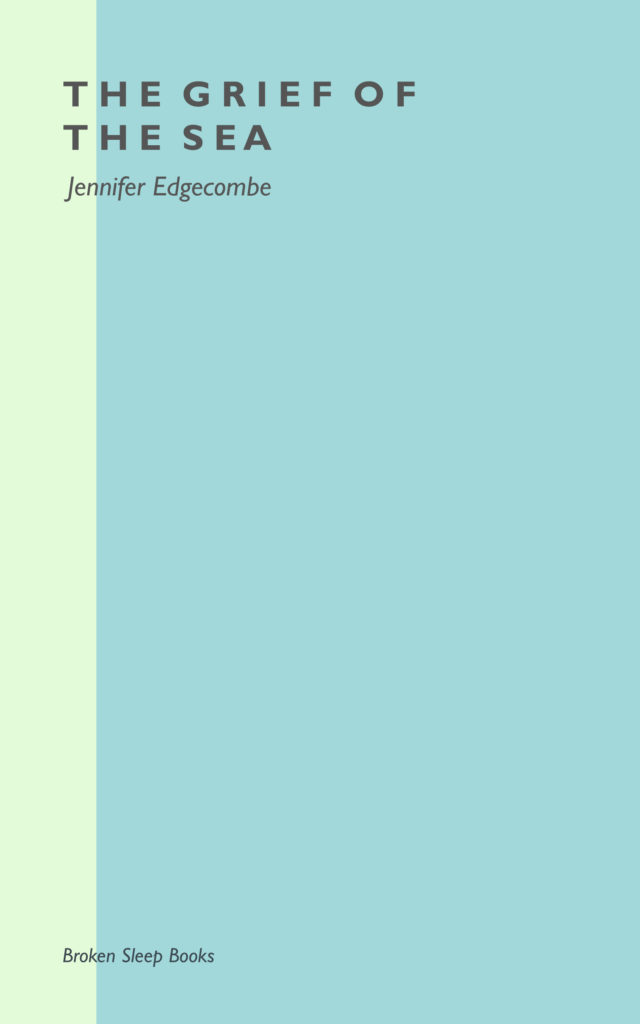Declan Ryan reviews the debut pamphlet from Jennifer Edgecombe — an exploration of loss and its relationship with the ocean.

W.S. Graham, a poet who spent plenty of time staring into the waves around Cornwall, wrote in his elegy ‘Dear Bryan Wynter’
Are you still somewhere
With your long legs
And twitching smile under
Your blue hat walking
Across a place? Or am
I greedy to make you up
Again out of memory?
Of his elegies, to Wynter, to Roger Hilton and to his own father, Graham once noted ‘They are not better for loosening a tear from the eye’ but I would respectfully disagree. Bryan Wynter, or at least his artwork, greets us from the first poem of Jennifer Edgecombe’s debut pamphlet, a suite of poems in and around the sea – and a beautiful object itself, in wave green and teal. Winter’s painting ‘Landscape, Zennor’ occasions a compressed, deftly imagist encounter which introduces us immediately to Edgecombe’s knack for blending an undertow of feeling with a matter-of-fact visual imagination. It’s a diamond of a poem, its dense layering of thought and impression putting its spare diction under pressure, glinting with suggestive, resonant phrases: ‘the moon in each headlight’, ‘my small body of water/rests in front of your canoe’. Edgecombe, throughout, displays a voice that is at once unperturbable and capable – through hints, small gestures, surprising pivots – of suggesting a depth of feeling, of loosening a tear, as it were. It’s a fascinating construction, seen again in ‘Zennor Churchyard’, a flattening or equalising which allows the reader to fill in their own response to the fact that ‘a laminated photograph, wildflowers’ are catalogued on an even keel with ‘those we’d walked across, under the grass’. There is no grand gesturing here, no mugging for the camera – perhaps her most impressive skill is a trust in her voice’s sensible candour, its generously self-effacing perceptions.
Another ace up the sleeve, and part of this drive towards generosity comes with Edgecombe’s faith in the flung poetry of the vernacular – she uses, to great effect, found ‘texts’, speech and conversation and the overheard, most notably in ‘The Penlee Lifeboat Disaster’ which is built entirely on other voices, mined from a documentary. It’s a brave, triumphant choice, allowing her to bring out the minor key understatements and repressions of those who lived through the nightmare and would – at least to some extent – prefer not to go into it. The poem, as a result, is studded with euphemism, with an attempt to look away, or at least deflect, the worst – and all the more powerful for it; ‘he said it was rolling a bit’, ‘bouncing significantly’, ‘it was getting very difficult’ – this is the language of grace under pressure, of a forlorn attempt to keep control or at least order things after the event, and this sort of heroic restraint gives us not only the narrative, but also its humanity and character, a shocked but never histrionic coping, out of necessity: ‘she went out/and she’s still out’.
Edgecombe has her own elegiac moments, her own reasons for coping: ‘Stunt Show Season’ and ‘elastic bands’ both touch on her brother’s death but, as with so much else here, do so elliptically, acceptingly, in something of a neutral tone which is quietly devastating: ‘But leaves fall earlier than we expect/and as the posters disappear/it’s hard to believe we had a summer.’ There is something of Graham’s greediness to make up, out of memory, the people and places scattered throughout this pamphlet, and also – pleasingly, joyously – Wynter’s pins even seem to be conjured back up in its closing poem and the catching of ordinary, and therefore remarkable, joy contained within, ‘The Waverley’: ‘We walked home. I saw us -/two figures joined at the hands/with very long legs’. It’s a wonderful debut, and Edgecombe’s is a compellingly persuasive, ‘overwhelming view/of home’, levelling big impressions into something that can be felt on the pulse, and stared out, ‘the day sliding down my bedroom wall.’
*
The Grief of the Sea is out now, published by Broken Sleep Books in both hardback and paperback. Buy a copy here.